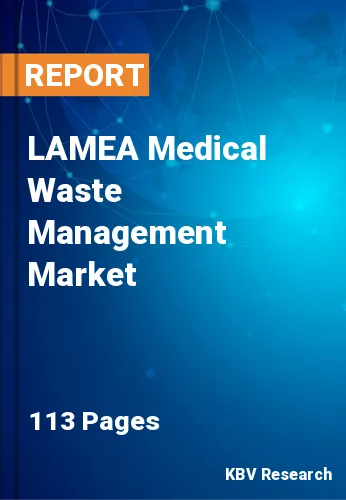The Latin America, Middle East and Africa Medical Waste Management Market would witness market growth of 7.5% CAGR during the forecast period (2022-2028).
Waste incineration is a common practise, insufficient incineration or the burning of inappropriate materials causes the release of pollutants into the air and the production of ash residue. Dioxins as well as furans, that are human carcinogens and have also been linked to a variety of harmful health effects, can be produced when materials that contain or have been managed with chlorine are burned. The dissemination of harmful metals in the environment can result from the combustion of heavy metals or materials with a high metal concentration, particularly those containing lead, mercury, and cadmium.
Care professionals, personnel who manage patients, medical waste, and their relatives, and the local community can all be endangered by poor waste management. Additionally, improper handling or disposal of such trash may pollute or contaminate the environment. Hazardous medical waste risks could be considerably decreased in unfavorable situations by taking sensible, practical steps. So, under conditions does it substitute for any current national waste management laws or programmes.
Owing to financial restrictions or the prevalent usage of disposable items, the majority of hospitals in the UAE lack the ability to pretreat medical waste. But, certain hospitals use specific pretreatment techniques for pathological and infectious waste, such as autoclave and chemical disinfection. None of the studied hospitals are using other pretreatment techniques like microwave, gas/vapor, or irradiation. Many hospitals in the UAE employ burning as one of the processes for treating medical waste.
The Brazil market dominated the LAMEA Medical Waste Management Market by Country in 2021, and would continue to be a dominant market till 2028; thereby, achieving a market value of $226.5 million by 2028. The Argentina market would showcase a CAGR of 8.1% during (2022 - 2028). Additionally, The UAE market is experiencing a CAGR of 7.2% during (2022 - 2028).
Based on Type of Waste, the market is segmented into Non-hazardous and Hazardous. Based on Hazardous Waste Type, the market is segmented into Infectious & Pathological, Sharp Waste, Pharmaceutical Waste and Others. Based on Service, the market is segmented into Collection, Transport & Storage, Treatment & Disposal and Recycling. Based on Treatment & Disposal Type, the market is segmented into Incineration, Autoclaving and Chemical Treatment & Others. Based on Treatment Site, the market is segmented into Offsite and Onsite. Based on Waste Generator, the market is segmented into Diagnostic Laboratories and Others. Based on countries, the market is segmented into Brazil, Argentina, UAE, Saudi Arabia, South Africa, Nigeria, and Rest of LAMEA.
Free Valuable Insights: The Global Medical Waste Management Market is Predict to reach $13.1 Billion by 2028, at a CAGR of 5.5%
The market research report covers the analysis of key stake holders of the market. Key companies profiled in the report include Veolia Environnement S.A., Waste Management, Inc., Clean Harbors, Inc., Remondis SE & Co. KG (Rethmann Se & Co. Kg), Biomedical Waste Solutions, LLC, Daniels Sharpsmart, Inc. (Daniel Health), Sharps Compliance, Inc., Republic Services, Inc. (Cascade Investment Group, Inc.), EcoMed Services (Tristel Plc) and Stericycle, Inc.
By Type of Waste
By Service
By Treatment Site
By Waste Generator
By Country
Our team of dedicated experts can provide you with attractive expansion opportunities for your business.

